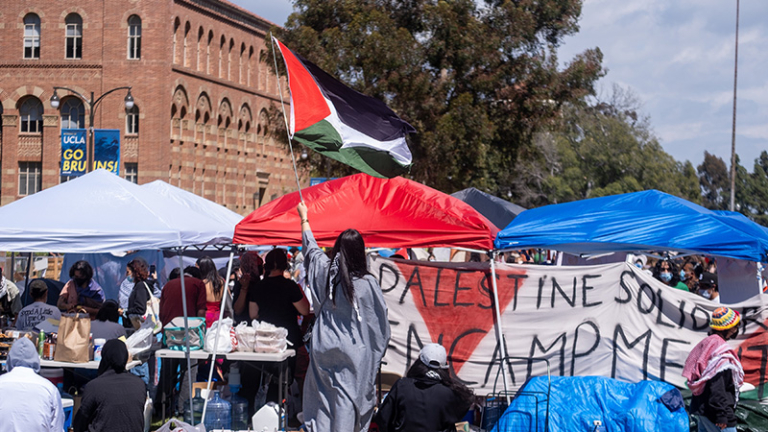
It has been a month since student protests started at Columbia University with the establishment of a protest encampment on April 17. In response, students around the country have mobilized in solidarity with Palestine, demanding that their universities divest from companies profiting from Israel’s war on Gaza, among other demands. Their movement has resonated with millions of Americans who have become increasingly concerned with the United States’ one-sided support for the war.
Over the last month, student protesters have faced fierce backlash from university administrators, big donors, and politicians. According to reporting from the Associated Press, there have been nearly 2,900 arrests of student protesters at 57 colleges and universities. When not facing criminal prosecution, students have been suspended, expelled, or barred from their campuses. Beyond these punitive responses, protesters have also faced accusations of anti-Semitism. Broadly, the campus demonstrations have been mischaracterized as anti-Semitic attacks on Jewish students. This tactic to delegitimize the protesters’ principled political stance is, of course, neither new nor unique to the current student movement, but is a familiar feature of efforts to demonize those who criticize Israel’s policies, American Jews included.
But what is perhaps unique about the recent flurry of activism has been the coordinated response in Congress to squash it. To be sure, Congress is in the process of orchestrating an organized crackdown on the peaceful protests. While Republicans have been at the forefront of this process, it should be said that the draconian response to the countrywide protests has had a distinct bipartisan flavor. Less than a week after the Columbia University encampment began, President Joe Biden condemned the protesters as “anti-Semitic,” denouncing the students’ civil disobedience by saying that “there’s the right to protest but not the right to cause chaos.”
In the aftermath of the president’s statement, Republicans launched a multi-pronged campaign to target the protests. At the center of this push has been an effort to codify an expanded federal definition of anti-Semitism that conflates it with criticism of Israel and Zionism. Recently, the House of Representatives passed H.R.6090, “the Anti-Semitism Awareness Act of 2023,” by a vote of 320-91, which would require the Department of Education to include criticism of Israel under a definition of anti-Semitism when enforcing federal anti-discrimination laws. While the bill has stalled in the Senate, additional efforts to institutionalize the definition are soon likely to follow.
The Republican leadership in Congress has been transparent to this end. On April 30, House Speaker Mike Johnson (R-LA) announced his intention to launch a House-wide probe into campus protests that would include at least six House committees. Kicking off the probe, the House Education and Workforce Committee held two hearings in early May, one on the Department of Education’s policies regarding anti-Semitism on college campuses, and another on anti-Semitism in K-12 schools. In both hearings, committee members used their time to accuse educators and academic institutions of fostering anti-Semitic activity. Adding to the pressure on schools and universities, both chambers of Congress have seen bills and letters calling for the withholding of federal money from institutions of higher education if they do not remove protesters.
Outside of pressure on academic institutions, policymakers have homed in on students. In addition to calling for the immediate prosecution of protesters, Senate Republicans have sought to revoke the visas of international students participating in protests. Complimentary efforts have gained steam in the House. Bills H.R.8221 and H.R.8322 both seek to cancel visas and authorize the deportation of foreign nationals who are charged with a crime related to their participation in “pro-terrorism or antisemitism rallies or demonstrations.” Congress has also sought to make student protesters ineligible for receiving federal student loans. Earlier this month, bills H.R.8242, H.R.8332, S.4240, S.4302 were all introduced, each of which seeks to disqualify protesters from receiving forgiveness, cancellation, waiver, or modification of certain federal student loans. More fringe efforts to target student protesters have also gained footing. Rep. Andrew Ogles’ (R-TN) recent bill H.R.8321 requires any person convicted of unlawful activity at a campus protest to provide community service in Gaza; in the Senate, Sen. Roger Marshall (R-KS) led a bill that would place activists on the FBI’s “No-Fly List.”
In this context, the systematic attack on student activists around the country should not be taken lightly. Congress’s near singular focus on stymying pro-Palestine activism marks the culmination of months of work from both Republicans and staunchly pro-Israel Democrats to discredit the legitimate demands of protesters. President Biden’s continued rejection of voices critical of his Israel policy, especially among those on whom he is counting for reelection this November, has surely made the current onslaught of legislative activity possible. In turn, it has become clear that US officials and lawmakers would prefer to weaken constitutionally protected freedoms rather than reconsider support for Israel’s assault on Gaza. While student activists are the focus of the day, the crackdown on their activism has far deeper implications for American civil liberties for years to come.
Featured image: Shutterstock/Ringo Chiu

